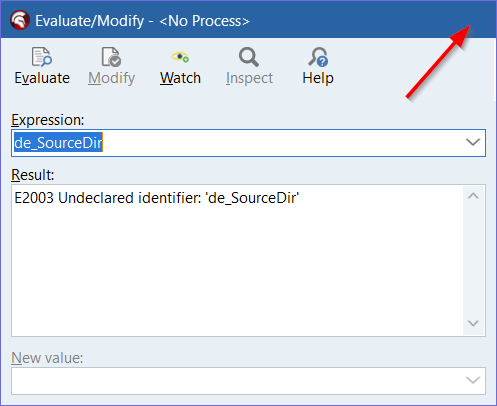-
Content Count
3018 -
Joined
-
Last visited
-
Days Won
108
Posts posted by dummzeuch
-
-
According to Firefox, the certificate for this domain has expired.
-
2 hours ago, David P said:Has anyone added MFA support using authenticator apps for their application? Any resources greatly received.
dzOTP
Tool to test OneTimePad tokens generated by the FreeOTP Android AppThat was a long time ago, so I don't really remember how exactly this worked.
-
8 hours ago, zed said:Have you considered moving development to GitHub? After all, SVN is quite outdated, and SourceForge feels rather archaic.
I've been asked this question several times before:
Yes I did, no I won't.
Edit: I should have mentioned that this is also answered in the FAQ in the post pinned to this sub forum:
https://en.delphipraxis.net/topic/4123-about-gexperts-some-frequently-asked-questions/
-
 2
2
-
-
Very important, if you use TForm.OnCreate events and plan to work with Delphi 10 and 12.3 in parallel for a while: They dropped the TForm.OldCreateOrder property. All previous Delphi versions set this value to False when a new form was created in the IDE. But if open an existing project in Delphi 12 and save a dfm file, the OldCreateOrder value will be removed. When you then open it in Delphi 10 OldCreateOrder will get assigned its default value, which is True. So by saving in Delphi 12 and then in Delphi 10 the OldCreateOrder value changes from False to True. Uwe Raabe blogged about the consequences this can have.
On top of that you will likely have much "fun" with Windows per display scaling which is supported by Delphi 12.
-
 2
2
-
-
If you have been updating the GExperts sources (or are following the activity on SourceForge) you might have noticed that there quite a few bugs have been fixed. That was not me alone (I am on vacation so I have some more time than usual) but also @Achim Kalwa (thanks Achim!).
Many of these fixes were for the code formatter, but there are some more for glitches in the UI, in particular for scaling problems.
read on in the blog post.
-
 4
4
-
-
54 minutes ago, David Heffernan said:Why would [ref] be needed to use asm?
If you pass a const parameter which you want to reference by its address in asm code, you need to make sure that it actually is passed as a reference and not in any other form.
-
2 hours ago, David Heffernan said:Is there any known use case other than the one demonstrated by FreeAndNil, namely to allow modification of a const param?
Maybe if you want to use ASM to access the parameter?
-
 1
1
-
-
2 minutes ago, Uwe Raabe said:I wonder if beta testing for the patches would help here.
Aren't we doing that right now?
-
 2
2
-
 2
2
-
-
22 minutes ago, bravesofts said:Thanks, that worked correctly!
However, I'm still not knowing the native way to distinguish between true menu bar items (top-level items in the
TMainMenu) and internal submenu items !You apparently missed my answer:
1 hour ago, dummzeuch said:TMenuItem has got a Parent property of type TMenuItem. I haven't checked but I would assume that it is NIL for main menu items.
Edit: I was wrong. See online help here:
https://docwiki.embarcadero.com/Libraries/en/Vcl.Menus.TMenuItem.Parent
It's identical to the MainMenu's Items property. But that's just as good for detecting main menu items.
-
TMenuItem has got a Parent property of type TMenuItem. I haven't checked but I would assume that it is NIL for main menu items.
Edit: I was wrong. See online help here:
https://docwiki.embarcadero.com/Libraries/en/Vcl.Menus.TMenuItem.Parent
It's identical to the MainMenu's Items property. But that's just as good for detecting main menu items.
-
You must set the height of the memo with alBottom. Everything else will adjust automatically (unless the splitter acts up then it will be moved above the memo with alClient 😞 in that case you can hopefully set the splitter's top position to move it back between the memos where it belongs).
-
 2
2
-
-
On 9/20/2024 at 11:10 AM, havrlisan said:I'll also mention GExperts throughout this post, as it includes some useful features that can speed up using the tools listed below.
In addition to allowing to change keyboard shortcuts, GExperts has the Uses Clause Manager which on the Identifier tab offers similar functionality as the Delphi Uses Helper. The UI is very different though, but it also finds partial matches (but not typos).
-
 1
1
-
 1
1
-
-
msmpeng is Windows defender. Try to temporarily disable it and see whether the performance improves.
-
 1
1
-
-
But we have Vibe Coding now!
-
 2
2
-
-
As @DelphiUdIT already said: The first thing you need is a compiler that creates binaries for Linux. And Delphi Professional - regardless which version - doesn't include that. According to Embarcadero's overview, you need at least the Enterprise SKU.
On top of that, you might need GUI libraries, this is where FMXLinux comes into play. Of course the question is, whether you actually need a GUI. What kind of applications do you plan to develop?
-
 1
1
-
-
Just to make one thing clear: GExperts does not support the 64 bit version of the IDE and the installer does not add it to that IDE.
The error you get regarding the UsesClauseManager may well be caused by a problem of the IDE itself before that.
I don't use the C++ personality of Rad Studio (I usually only install the Delphi personality), so I can't really say anything about the cause. And since nobody else working on GExperts (there currently is 3 of us off and on) uses C++, there is little chance of fixing any problems with it. Unless of course somebody else steps forward now.
-
I just built a test installer for 12.3.
Note: This is from the current source code, including all the bugs I might not yet have found.
http://download.dummzeuch.de/GExperts/1.3.25_2024-08-24/GExperts_RS12_test-for-12.3_2025-04-13.exe
Note to people who might read this later on: I might delete that file without notice at any time in the future. There will hopefully be a new release by then.
-
I am using GExperts with Delphi (RAD Studio) 12.3 and it works just fine. But admittedly I am using a DLL compiled from the current sources.
What do you mean by "the IDE fails to start"? Is there any error message?
-
On 4/11/2025 at 10:23 AM, dummzeuch said:Knowing my luck, it might be yet another effect of using two screens in a peculiar setup that's apparently unique on planet earth.
It apparently is: It does not happen on my laptop with a single HD screen. Nor on my desktop when I turn off the 4K monitor or alternatively the HD monitor. And after starting Delphi once with only the HD monitor connected, it no longer happens with both monitors.
Sounds like an easily reproducible problem, doesn't it?
-
 2
2
-
-
You probably copied source code that only contained line feeds (#10) or only carriage return (#13) rather than the Windows (DOS) convention with carriage return followed by line feed (#13#10).
Notepad cannot handle this, other editors (e.g. Notepad++) can. The latter can also convert between the different styles too.
The IDE in the latest versions can automatically correct that for you, if this option is enabled.
-
4 hours ago, Uwe Raabe said:There are several toolbar issues listed as fixed in 12.2.
Yes, but the problem I reported still happened in 12.2. That's why I created a workaround when I started using Delphi 12(.2) in earnest.
-
23 minutes ago, Uwe Raabe said:It doesn't happen here and at least I cannot remember having this seen anytime.
As usual: Can you reproduce with a vanilla IDE installation?
I am sure it has been like this from the first Delphi 12 installation which of course was "vanilla" back then. But since I just realized it might be a bug I have not yet tried to reproduce it.
Knowing my luck, it might be yet another effect of using two screens in a peculiar setup that's apparently unique on planet earth.
-
IDE toolbars get scrambled over time
The toolbars of the IDE lose icons when starting, exiting and restarting the IDE multiple times (see screenshot). This bug had already been reported in the old quality portal for Delphi 11 and 12. It’s still there in Delphi 12.1. Resetting the toolbars to their default using the View → Toolbars → Customize dialog, helps for a while before the same happens again.
https://embt.atlassian.net/servicedesk/customer/portal/1/RSS-515
It seems to have been fixed in Delphi 12.3, at last I have not seen this problem after I updated my installations.
Maybe it has been fixed? The bug report is still open though, so maybe that was a side effect of some other change?
-
I just realized that this might be a bug: All my IDE windows look like this. The close button is not displayed, but it is there and works.
Is that just another oddity of my particular installation(s) or does this happen everywhere?

When the window is drawn I can for a short time see that there is actually a red button with a diagonal cross in it, like it should be, but it is overwritten with just the blue title bar. This is also the case for the main IDE window itself. Docked windows do have the close button, but as soon as I undock them it disappears too. It comes back when I dock them.
![Delphi-PRAXiS [en]](https://en.delphipraxis.net/uploads/monthly_2018_12/logo.png.be76d93fcd709295cb24de51900e5888.png)


How do I assert a single ?
in Delphi IDE and APIs
Posted · Edited by dummzeuch
What's wrong with
Or, if you want to set the maximum allowed difference yourself
Edit: @Cristian Peța already suggested that.